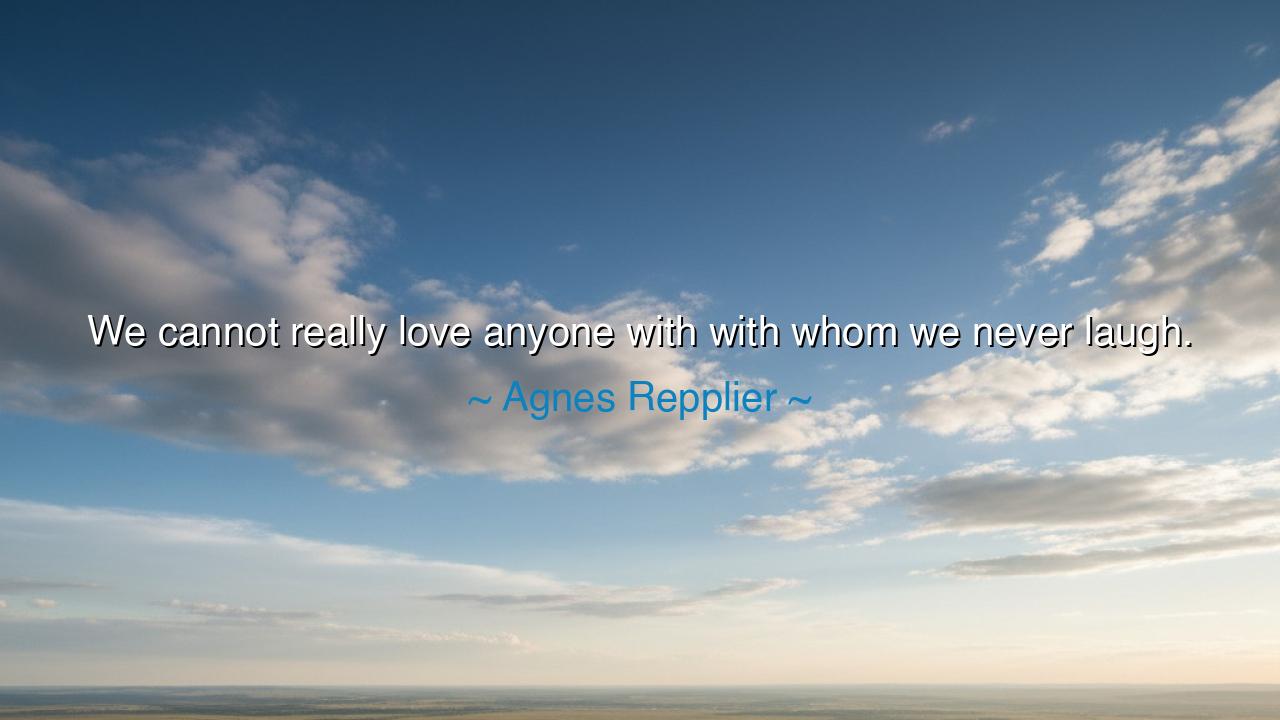
We cannot really love anyone with with whom we never laugh.






Agnes Repplier, wise observer of the human heart, spoke truly when she said: “We cannot really love anyone with whom we never laugh.” In these words lies the revelation that love is not forged only in solemn vows or silent devotion, but in the shared lightness of spirit, the joyous spark that binds souls together. Without laughter, affection is heavy; without joy, companionship grows weary. For in laughter we glimpse the soul unguarded, and there, in that moment of brightness, we come to know the one we cherish.
The ancients taught that the divine fire of love is both solemn and playful. Even mighty gods, when they revealed their tenderness, were often found in jest and mirth. To laugh together is to lay aside pride and fear, to walk in harmony without armor, without masks. In that laughter, two beings are no longer divided, but one — their hearts beating in rhythm with joy. Thus Repplier reminds us that love cannot thrive where laughter is absent, for joy is the very breath of intimacy.
The origin of this truth is found in the simple rhythms of daily life. Families are knit not only by duty, but by stories told at the hearth, by smiles exchanged, by shared amusement at life’s folly. Friends become brothers and sisters through the bonds of mirth. Lovers become companions for eternity not merely through passion, but through the echo of their laughter, which lingers long after words fade. It is this joy, this lightness, that cements the foundation of enduring love.
Yet the teaching is also a warning. Where laughter dies, love falters; where mirth is banished, affection turns to duty alone, and the bond grows brittle. To laugh together is to renew the covenant of hearts, to remind one another that even in the weight of sorrow, there is still light. Without this, love risks becoming a burden rather than a blessing.
So let future generations hold fast to this wisdom: cherish those with whom you can laugh, for they are the ones with whom you can truly love. In joy shared, burdens grow lighter; in smiles exchanged, trust is deepened. And when the storms of life rage, it is laughter — that divine spark — which will carry love across the dark waters into the dawn.






Ddp
I really like how Repplier emphasizes laughter in love. It’s so true that humor can reveal a lot about how comfortable two people are with each other. But I also wonder, what if one person just doesn’t find the same things funny? Can that create a barrier in the relationship, or can love exist without this particular form of bonding? It makes me think about the different ways love can manifest.
QNNguyen Thi Quynh Nga
This quote makes me reflect on the nature of love and connection. It seems to suggest that humor is more than just a fun addition—it’s essential for building lasting intimacy. But does this mean that couples who struggle to laugh together can’t truly love each other? Can love survive without shared humor, or is it a sign that the relationship might be lacking in other important aspects?
BLBach Lan
I love the sentiment behind this quote, but it also makes me question how much laughter really contributes to lasting love. Is laughter an essential ingredient, or is it a way to disguise deeper issues in a relationship? Sometimes, people laugh to cover up discomfort or avoid tough conversations. So, does genuine love require laughter, or just an honest, authentic connection?
DTAnh duong Tran
Repplier’s quote makes me think about how we often overlook the importance of humor in relationships. Laughter seems to break down barriers and create a shared experience. But I also wonder, can love still exist without shared humor? Are there relationships where love doesn’t depend on laughter, or is this the secret ingredient that keeps things light and enjoyable?
TTCao Huynh thanh truc
This quote really resonates with me because laughter often feels like the most genuine form of connection. When you can laugh together, it suggests that you’re comfortable with one another, that you share a sense of humor, and that you understand each other. But what if someone doesn’t find the same things funny? Does that mean there’s no love, or is it just about finding new ways to connect?